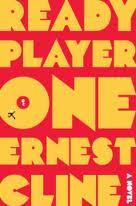
 Ernest Cline has a thing for 1980s pop culture the way James Joyce had a thing for the Dublin of June 16, 1904. But you can't re-create a cultural landscape in fictional prose the way you can an actual city, so Cline's come up with a clever workaround: he's created an imaginary online universe programmed by an equally obsessive '80s fan, and then gives his characters (and readers) a compelling reason to explore it.
Ernest Cline has a thing for 1980s pop culture the way James Joyce had a thing for the Dublin of June 16, 1904. But you can't re-create a cultural landscape in fictional prose the way you can an actual city, so Cline's come up with a clever workaround: he's created an imaginary online universe programmed by an equally obsessive '80s fan, and then gives his characters (and readers) a compelling reason to explore it.
It's 2044, and teenager Wade Watts is one of the millions of people who are scouring the virtual reality of the Ontologically Anthropocentric Sensory Immersive Simulation (OASIS, for short) for the clues left by its creator, the late James Halliday, that will lead to the "Easter egg" representing his multibillion-dollar fortune--a souped-up version of the extra flourishes that video game designers have been hiding in their work since the days of the Atari 2600. Wade has an intuitive flash that helps him discover the first puzzle, which combines a classic Dungeons & Dragons module with one of the more unusual '80s arcade games, near his high school (given the mess that's become of the real world, of course he's attending school online), but he also crosses paths with Art3mis, a semi-famous egg hunter he's had a crush on for years.
Romance will have to wait, though: not only does Wade need to go through the "you don't know me, you just know me online" conversation, he also faces a threat from a technology corporation that's pouring its resources into making sure Halliday's fortune, and control of the OASIS, will wind up in their hands. The ensuing adventure will take him to a slew of imaginary worlds, drop him into the starring role of cult movies, and even provoke a daring act of real-world industrial sabotage.
One of Cline's greatest challenges is to resist letting the pop culture references do all the heavy lifting; if Ready Player One was just a string of "Ooh, they're talking about Ladyhawke! Hey, he just quoted They Might Be Giants!" scenes, the novelty would wear off fast. It's not enough that readers should want to see the quest solved, they also need to care that Wade's the one who will do it--and the novel largely succeeds on this front, as Wade's online successes are matched by a gradual maturation offline. That said, there's a lot of the '80s crammed in here, and chances are that if you were born between, let's say, 1965 and 1975, you'll be giving the author virtual high-fives for including one or more of your more obscure favorites.--Ron Hogan
Shelf Talker: Cline has concocted an alluring, immersive environment: imagine a novel about playing the iconic 1990s computer game Myst, but with major real-world consequences for the player.

